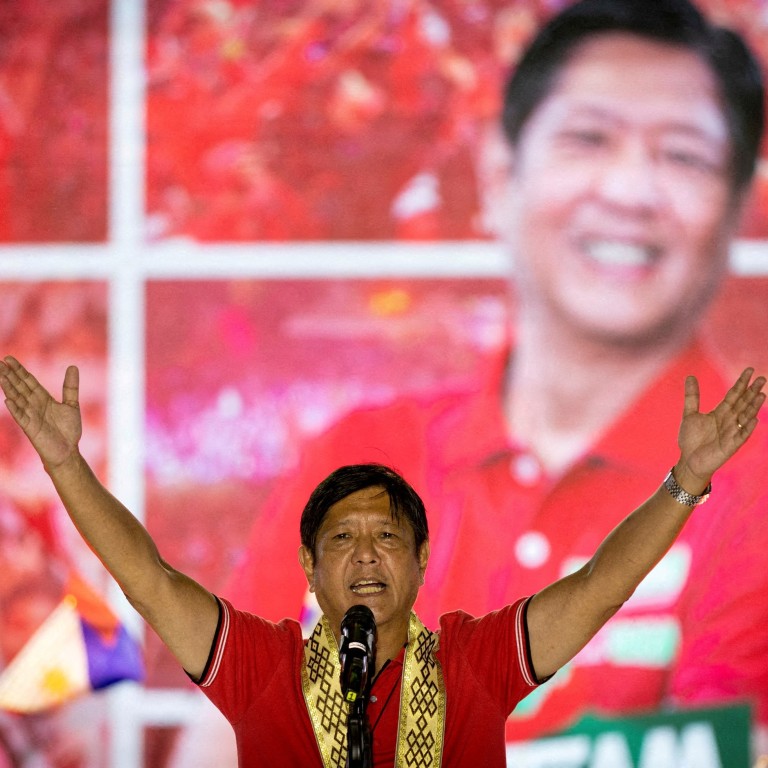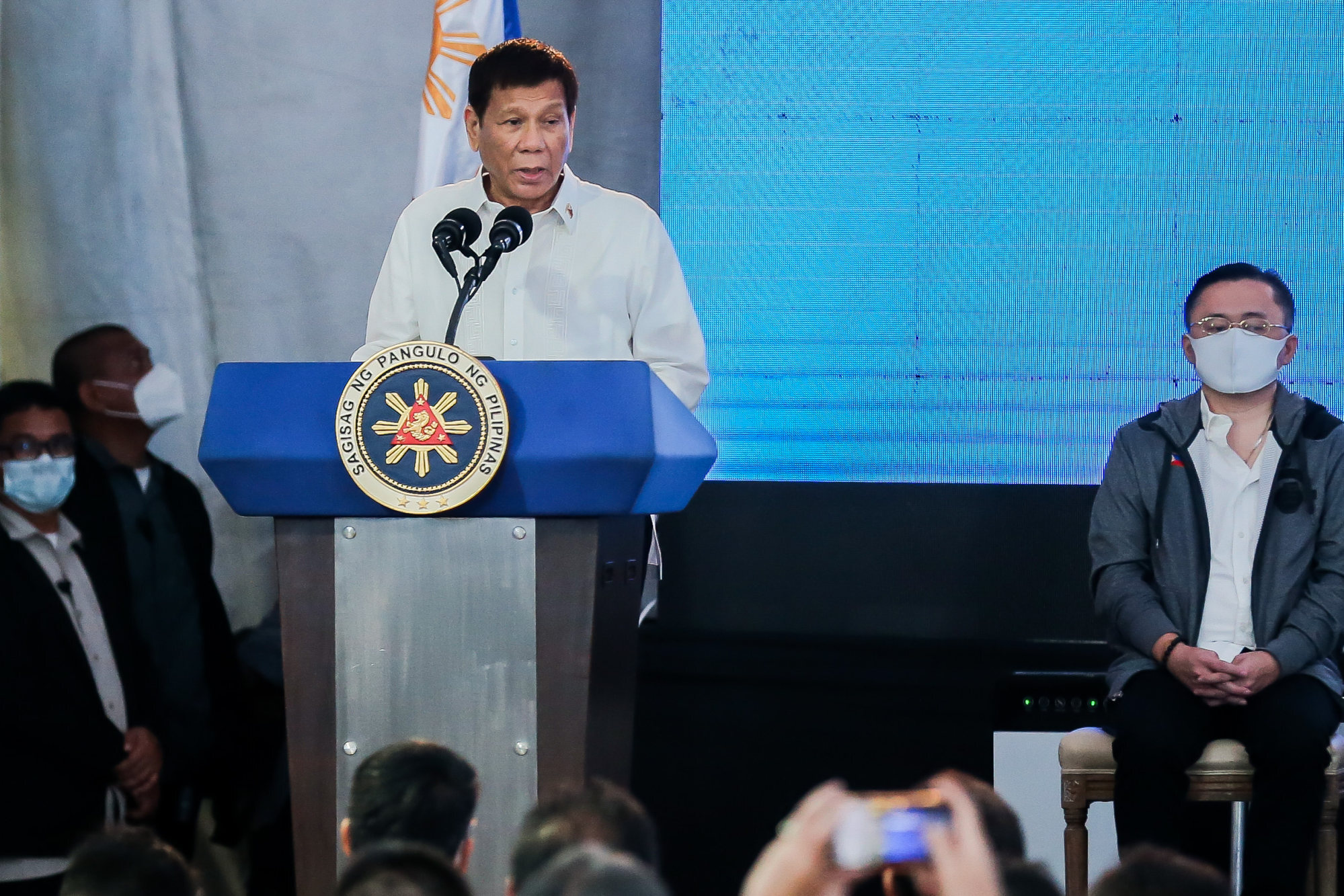
Duterte’s last-minute endorsement could seal the deal for Bongbong Marcos Jnr, but will the outgoing Philippine president give it?
- Incumbent President Rodrigo Duterte has yet to anoint a successor ahead of the May 9 election, but he could simply be waiting for the opportune moment
- Marcos Jnr is seen as more likely than his closest rival, Leni Robredo, to protect Duterte from prosecution – but the strongman’s son comes with more baggage
The popular incumbent initially expressed little interest in the May 9 election, but has since endorsed several local and senatorial aspirants – and supported the vice-presidential bid of his daughter, Sara Duterte-Carpio.
He has yet to anoint a successor, but may yet weigh in at the most decisive moment. Given how fluid the run-up to this heated contest has been, a last-minute intervention by the feisty leader cannot be ruled out.
Duterte has made several allusions to the presidential race, but often in coded remarks that make it difficult to spot the red herrings.
After describing one candidate as a “weak leader” and cocaine user who was only riding on the strength of his family’s name, many assumed Duterte was describing Ferdinand “Bongbong” Marcos Jnr, son and namesake of the late Philippine strongman, who is currently leading in the opinion polls.
Marcos Jnr’s camp dismissed the remarks, however, with the candidate himself calling them “plain politics” in a recent interview and Duterte’s way of keeping “everyone on their toes”.
Will Marcos Jnr be the first Philippine president who cannot visit the US?
Supporters of Maria Leonor Robredo were quick to point out that such a description fits their candidate, the current vice-president who is trailing Marcos Jnr in opinion surveys.

Weeks before relinquishing power, Duterte’s approval ratings are higher than any of his four predecessors at this point in their presidencies.
Critics of the former Davao City mayor have sought to portray him as a lame-duck leader, but his influence was tested and proven in 2019’s midterm elections. Eight of the 12 senators elected in those polls came from his anointed slate, with none from the opposition Otso Diretso’s roster.
The mixed signals Duterte has been giving ahead of next week’s polls may be part of a deliberate ploy to ensure the continuation of legacy programmes, such as his controversial drug war.
Candidates agreed to be tested for drugs after he accused one of being a narcotics user. They also weighed in on the wider policy, with most saying they would carry on the crusade – though with a variety of caveats, ranging from reducing police abuses in drug busts to emphasising the need for drug users’ rehabilitation.
Duterte’s drug war: global human rights coalition to aid ICC in inquiry
Most candidates also voiced support for continuing his flagship “Build, Build, Build” infrastructure programme, though suggested a change in focus to cover more housing and hospitals, digital connectivity, or rural infrastructure such as farm-to-market roads and irrigation, with a greater emphasis on due diligence and sustainable debts.
Duterte met Marcos Jnr last month, reportedly offering advice and sharing experiences with him – raising hopes among the latter’s supporters that he would soon earn the president’s endorsement.
A faction of Duterte’s ruling PDP-Laban party have endorsed Marcos Jnr, as did several other political parties following the pair’s meeting. PDP Laban and the Marcos-Duterte “Uniteam” – a coalition of Marcos Jnr and Duterte-Carpio’s supporters – plan to hold joint rallies where the outgoing president may have the chance to confirm a preferred successor.
Having Duterte’s daughter as his running mate is already a big win for Marcos Jnr, but getting the nod from her father could prove even more significant. With both Dutertes on his side he can more effectively rally votes in the south of the country – the Visayas and Mindanao – where he suffered setbacks during his 2016 bid for the vice-presidency.

Marcos Jnr’s traditional bailiwick is in the northern and central regions of the main island of Luzon, where he picked up the most votes six years ago. His gambit to now connect with southern voters seems to be paying off, with a powerful local party in vote-rich Cebu province recently endorsing his candidacy.
This north-south strategy has echoes of Robredo’s 2016 successful campaign for the vice-presidency, in which she linked up with then-Senator Manuel Roxas II, whose family hails from the central Visayas, to secure votes there in addition to her own stronghold of southern Luzon.
It worked for Robredo then and seems to be doing so for Marcos Jnr now, with most polling showing him ahead by wide margins in many of the regions surveyed.
But it never pays to be complacent. To avoid a repeat of his 2016 defeat to Robredo, Marcos Jnr’s campaign strategists will be keen to sustain their lead and provide as much cushion as possible – which must have played into the Uniteam’s motto of “always running scared” despite their comfortable position.
Philippine election takes twist as Marcos loses ground to Robredo in Davao
Receiving Duterte’s blessing days before the elections could help Marcos Jnr reinforce his lead. But it may also upset other candidates who likewise covet the presidential imprimatur. The idea of frustrated rivals coalescing around a candidate to defeat Marcos Jnr is already remote, however.
In an Easter press conference, several contenders vowed to carry on with their respective campaigns until the end – dealing a blow to Robredo’s desire to unite the opposition and undermine her main opponent’s claim that he is the unity candidate.
Macros Jnr is seen as the continuity bet, and the candidate most likely to protect the outgoing president from the possibility of prosecution. But he also has far more baggage than his opponents, with the abuses and corruption associated with his late father’s 14-year martial-law regime casting a long shadow over his political career.
A spate of disqualification attempts and renewed interest in prosecuting Marcos Jnr and his family must be driving Duterte to hedge – and may portend a stormy term ahead should the strongman’s son win.
An unequivocal endorsement from the outgoing president could seal the deal for Marcos Jnr. But for now, Duterte is still playing his cards close to his chest, likely waiting for the moment that will have the most impact – although that window is fast closing.
Lucio Blanco Pitlo III is a research fellow at the Asia-Pacific Pathways to Progress Foundation. The views expressed in this piece are his own.

